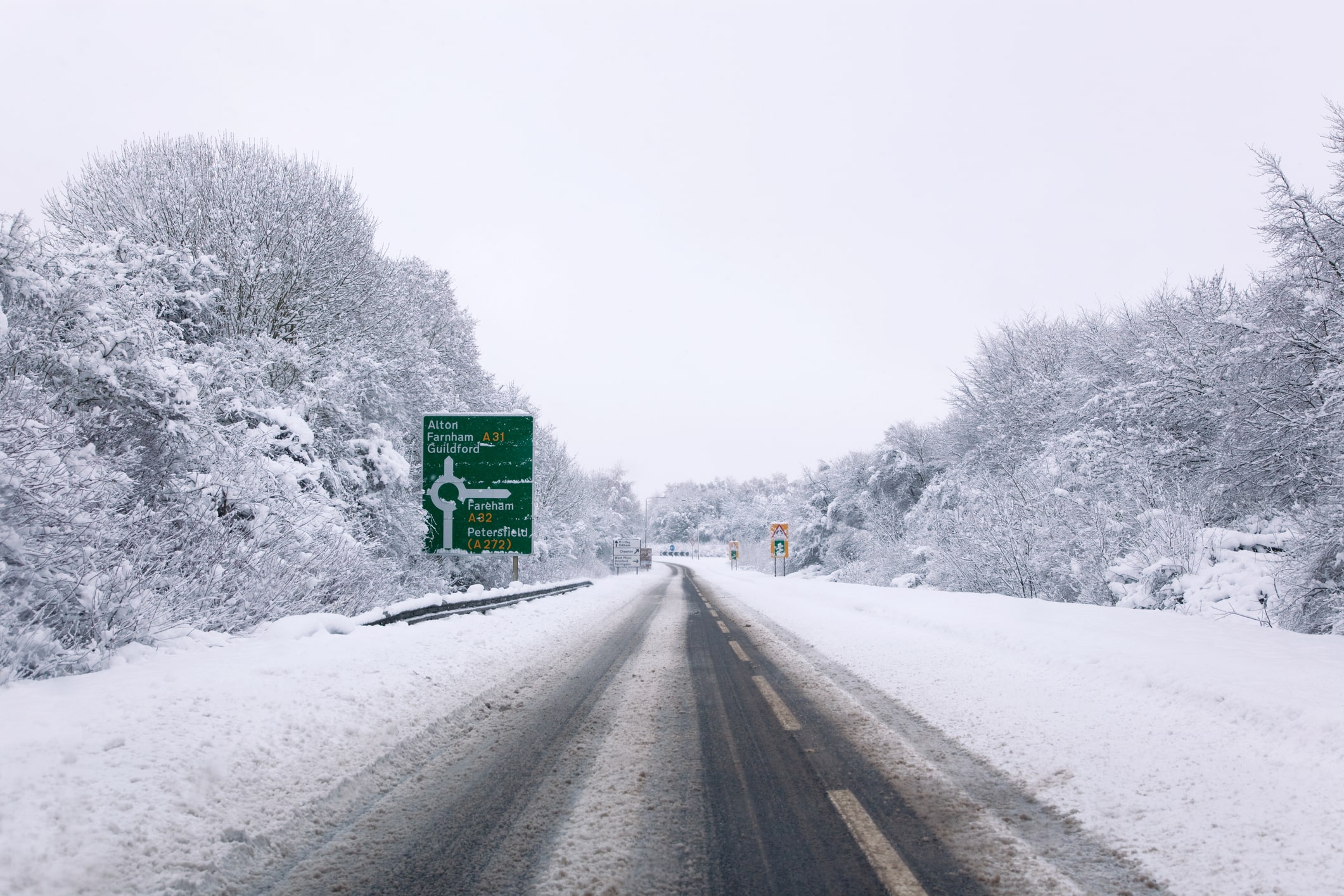As winter approaches, you might be getting your car ready for driving in colder temperatures, frosty conditions, and snow or ice-covered roads. Whether you’re a new driver or have had your license for some time, changing road conditions can bring a variety of new considerations, fears and other emotions along too. But with proper preparation, we want to reassure you that driving in winter doesn’t need to be a concern. So, how do Brits feel about everything that comes with operating a car during the winter months?
At Prestone, we surveyed nearly 1,000 drivers to understand how the British public feels about winter driving. We gathered insights into their vehicle maintenance habits and the biggest worries associated with driving during winter. Our results are broken down by age and region, revealing which groups feel most confident about getting behind the wheel at this time of year and who has been most affected by winter driving incidents.
Please note that percentages are rounded to the nearest whole number within our research.
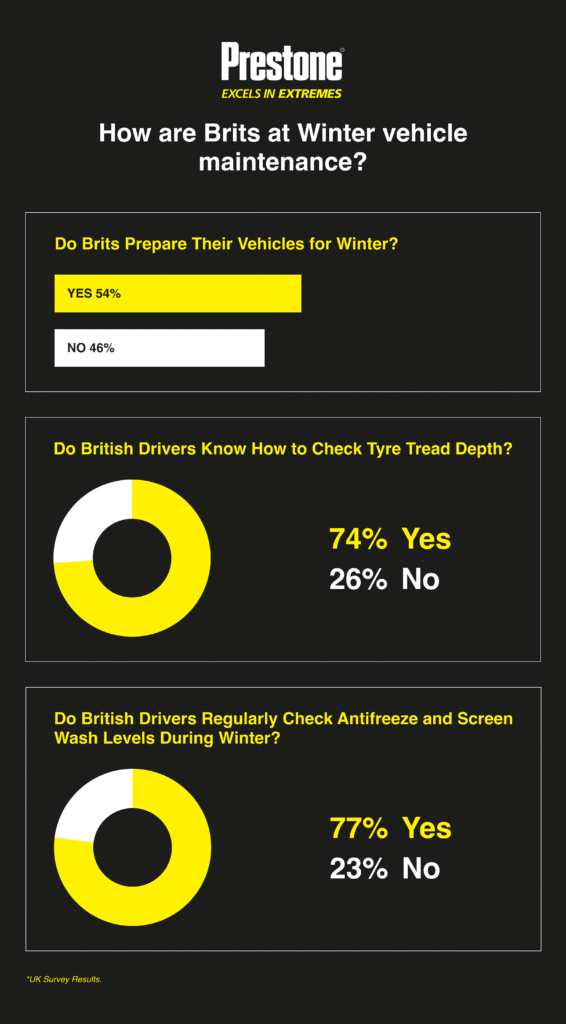
How are Brits at winter vehicle maintenance?
Vehicle maintenance during winter can be essential for keeping you and others safe on your car journeys. From engine fluid checks to tyre tread and general maintenance, there are a few tricks you should know about, so we put our survey participants to the test…
Do Brits prepare their vehicles for winter?
When asked whether they prepare their vehicle ahead of winter, over half of Brits (54%) said they will take specific measures to prepare their vehicle for winter driving this year.
Half of Brits (50%) said that vehicle maintenance is more important in the winter than in other seasons, and rightly so. However, this was closely followed by participants saying vehicle maintenance is important all year round (44%). All drivers should understand the importance of maintaining various parts of their car, especially at this time of year when road conditions can be dangerous, and temperatures can be low enough to cause damage to the mechanisms.
Do British drivers know how to check tyre tread depth?
Only a quarter (26%) of Brits said they didn’t know how to check tyre tread depth. If you’re one of these, the simplest method for checking that your tread depth is above the legal requirement is to slot a 20p coin into the tread. If the outer edge of the coin is covered, then you’re in the clear. If not, it’s probably time for new tyres.
In icy or wet conditions, you could be at risk of skidding or aquaplaning if your tyre treads aren’t above 1.6mm. Plus, driving on these tyres can land you with an MOT fail, points on your license and a fine of up to £2,500 per tyre.
Do British drivers regularly check antifreeze and screen wash levels during winter?
Over three-quarters of Brits (77%) regularly check their vehicle’s antifreeze and screen wash levels during winter. So, it seems that in terms of antifreeze, screen wash and tyre tread checks, British drivers are on top of the majority of their car maintenance duties.
Winter driving worries
The weather conditions, darker nights and shorter days can be worrisome for some drivers. Whether you’ve been involved in an incident during winter and now feel anxious about taking on the roads, or you don’t feel confident driving at this time of year for whatever reason, we’re here to show you that you’re not alone.
UK’s top winter driving fears
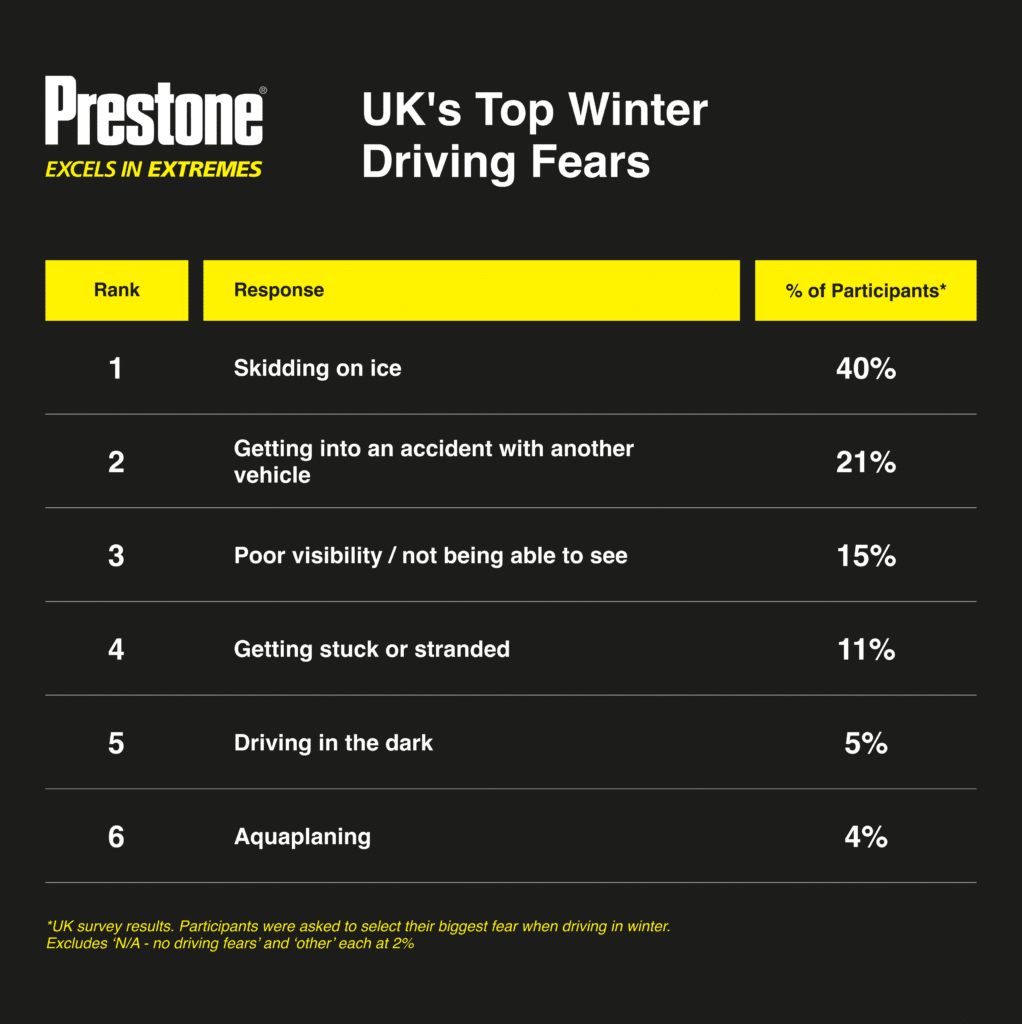
Skidding on ice was UK drivers’ top fear when driving in winter, with 40% of participants selecting this. But, as we mentioned, if your tyre treads are the correct depth, your risk of skidding can be much lower since you’ll be able to grip the roads better.
Interestingly, more than 1 in 10 Brits (11%) said getting stuck or stranded was their biggest fear. This could be down to the fact that people tend to travel further around Christmas and New Year, and those with this fear are worried about being stranded on unfamiliar roads.
Winter driving conditions that worry Brits the most
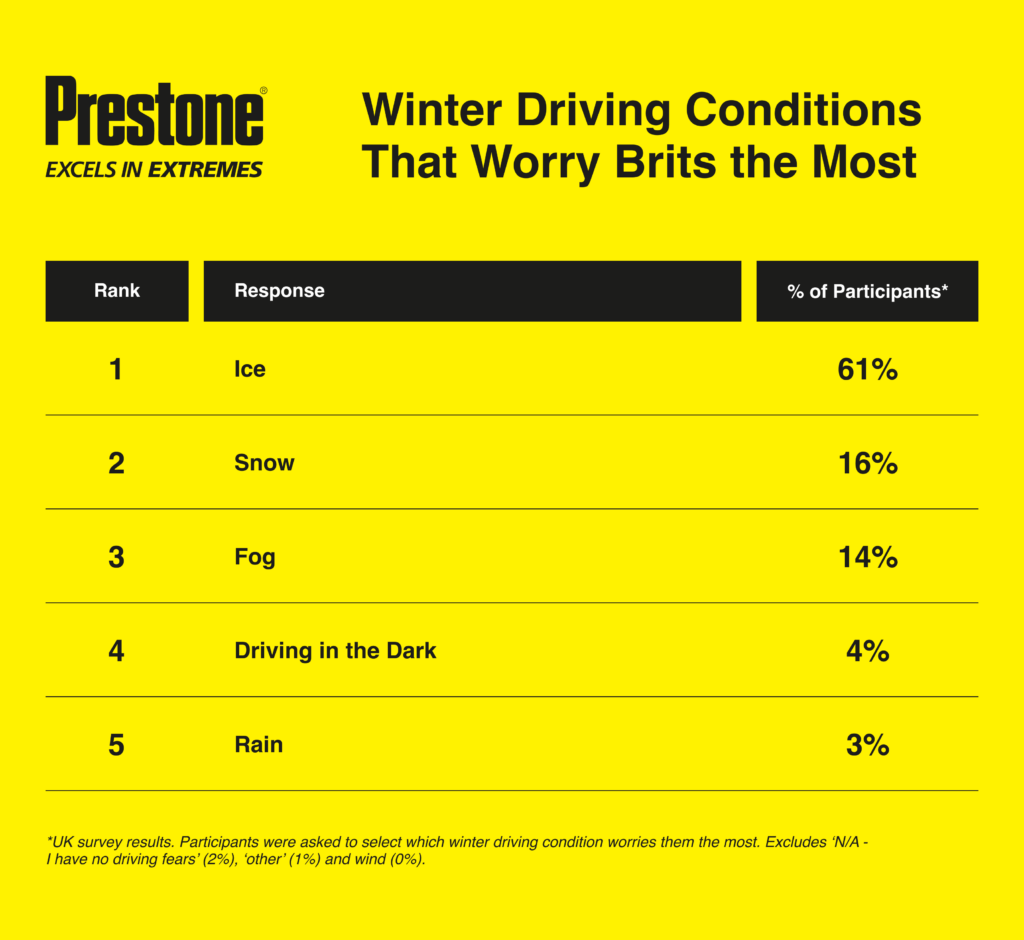
Winter brings plenty of worrying conditions to our roads in the UK, including ice, frost and snow. So, which of these worries us Brits the most?
Over 60% of respondents said ice was the winter driving condition that worries them the most, which makes sense considering the top winter driving fear is skidding.
Snow (16%) and fog (14%) were second and third most worrying driving conditions for British drivers. These conditions could lead drivers to become stuck or stranded, which is a common fear among our participants.
How does winter driving affect Brits’ overall driving confidence?
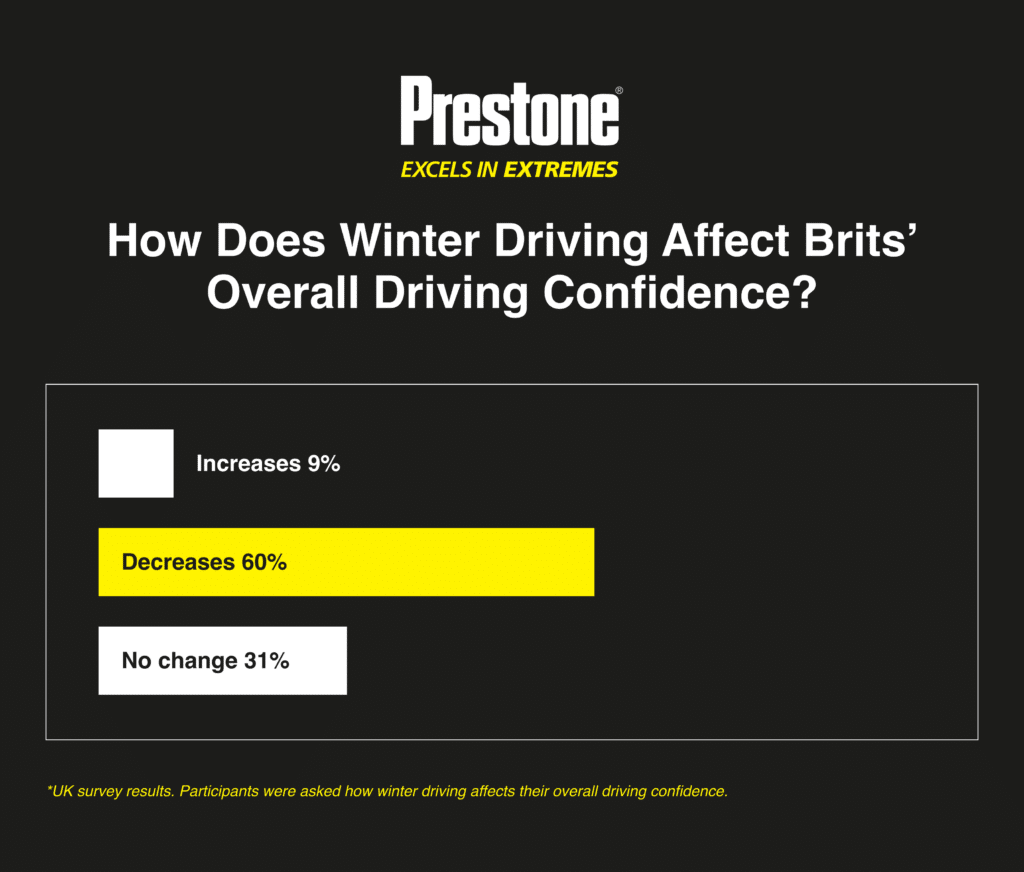
60% of participants reported that winter driving decreases their driving confidence, so if you’re somebody who worries about being behind the wheel when the temperatures drop, you’re not alone.
31% of participants stated that winter driving doesn’t impact their confidence. This suggests that nearly one-third of drivers either feel unaffected by winter conditions or have strategies in place to manage them.
Winter driving skills
Now we know all about the major worries and fears, how confident are we in our winter driving skills and abilities? Let’s find out…
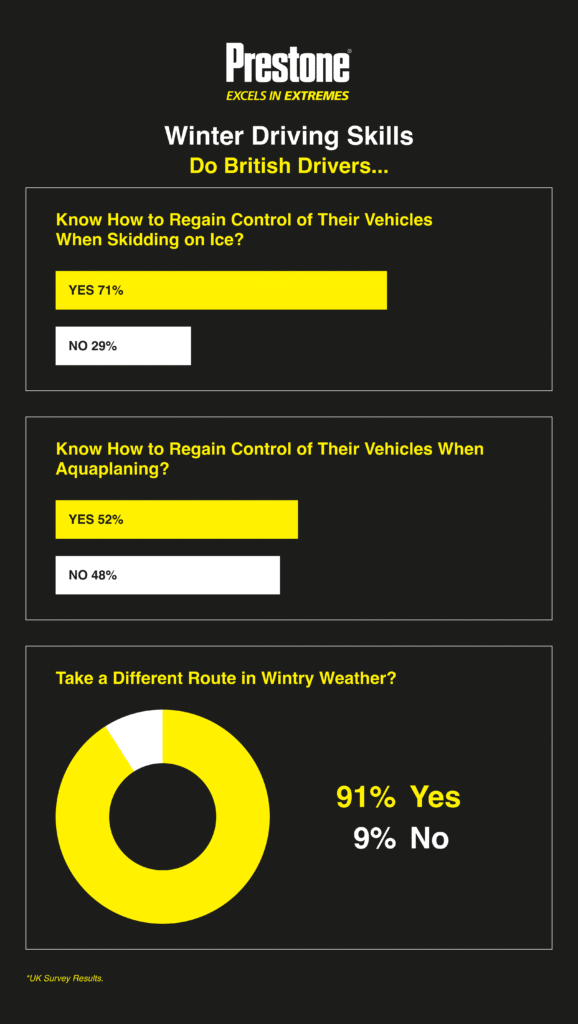
Do British drivers…
Know how to regain control of their vehicles when skidding on ice?
Nearly a third (29%) of participants admitted they wouldn’t know how to regain control if they were to skid on ice. A lack of knowledge on regaining control during a skid on ice can increase your risk of panicking, overcorrecting and accidents, which could endanger you as a driver, your passengers, nearby pedestrians and others on the road. The main things to remember are that you should stay as calm as possible, keep both hands on the wheel and don’t accelerate or brake since this could make the skidding worse.
Know how to regain control of their vehicles when aquaplaning?
Nearly half of participants (48%) said they wouldn’t know how to regain control of their vehicle if it was aquaplaned. Similar to skidding, it can be dangerous when a driver doesn’t know how to regain control since it can lead to panic, colliding with other vehicles, or veering off the road. Again, avoid harsh braking or acceleration and keep the steering wheel steady until you feel the traction of the road.
Take a different route in wintry weather?
An overwhelming majority (91%) of participants said they would take a different route to avoid hazardous roads in winter weather. This demonstrates a strong awareness of road safety, highlighting the willingness of most people to prioritise safety over convenience during dangerous winter conditions.
Regional results
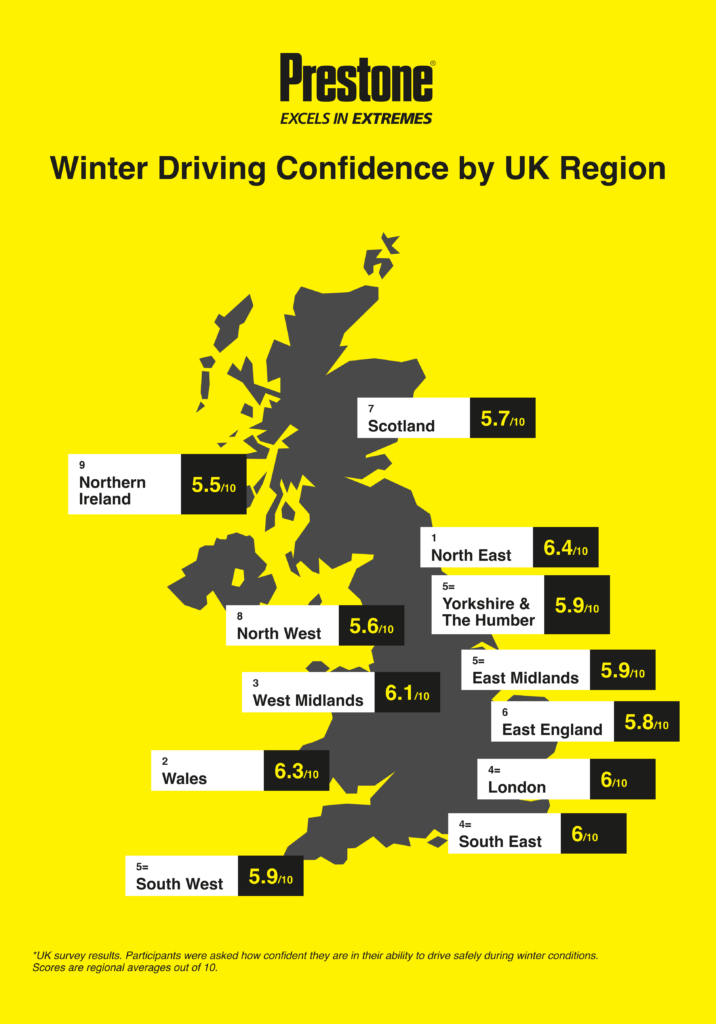
On a scale of 1-10, with ten being the most confident, we asked participants to rank their winter driving confidence. This revealed that confidence remains similar across the UK, with scores ranging from 5.5/10 (Northern Ireland) to 6.4/10 (North East).
No region scored below 5.5, indicating a decent level of confidence in winter driving safety across the UK. However, any score below 7 suggests most drivers take a cautious approach to winter driving.
Drivers in the North East region reported the highest confidence. This could be due to being further north and experiencing the wintry conditions more often, leading to skill adaptation and preparedness.
UK Regions with the most impactful driving incidences
Driving incidents can be more common during the winter, which is why we wanted to uncover the impact this has on driver behaviours.
Northern Ireland & West Midlands reported the most significant impact of winter driving incidents, with nearly a third of respondents (30.77%) changing their driving habits. Since Northern Ireland is the least confident region, this could be due to the effects of winter driving incidents.
Waleshad the lowest percentage of respondents who reported incidents leading to behavioural change (7.32%), indicating that even though they might have experienced incidents, they didn’t significantly impact winter driving behaviours.
Generational results
Which generation is most confident with winter driving? Our research reveals that Gen X are most confident in their ability to drive safely during winter, with a score of 6.2/10. This could be because they have more experience with wintry conditions and the amount of traffic on the roads.
The generation with the least confidence is the Silent Generation, with a score of just 4.6/10, which could be because many older people can struggle to react quickly to changing conditions.
When it comes to the generation most affected by winter driving incidents, Millennials (22.33% “Yes”) and Gen Z (22.22% “Yes”) were most likely to report winter driving incidents that led them to change their driving behaviours.
We hope you’ve enjoyed our in-depth research into how Brits feel about driving in wintry weather.
For further insights on everything from car maintenance to best practices for driving in different conditions, check out the Prestone blog.
